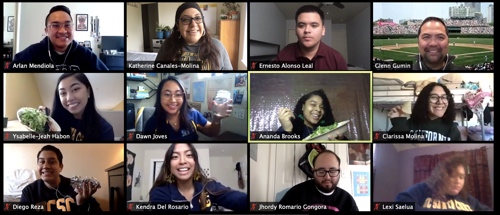Campus News
Slugs help high school students choose higher education
Student organizers of SIO Weekend had to cancel their in-person event in February when COVID-19 began impacting campus. But instead of pulling the plug altogether, organizers opted to serve their respective communities in a different way through a Student Initiated Outreach Yield Panel.

Despite not being able to host in-person events, student-led organizations are developing innovative ways to maintain their programs online by utilizing university resources like Zoom.
Over the weekend, student organizers held a virtual panel for more than 120 newly admitted high school students of color. The panel was held in place of Student Initiated Outreach Yield Weekend (SIO Yield Weekend), which traditionally consists of a weekend long stay on campus for roughly 75 newly admitted students.
Student organizers of SIO Weekend had to cancel their in-person event in February when COVID-19 began impacting campus. But instead of pulling the plug altogether, organizers opted to serve their respective communities in a different way through a Student Initiated Outreach Yield Panel.
UCSC student Ysabelle Habon, one of the panel’s coordinators, said the goal of this year’s event was still “to provide newly admitted students of color, our unique perspectives of higher education, advice about college and connect with current UCSC students.”
The SIO Yield Program has hosted 12,400 high school students since its inception in 2003. Roughly 60.4 percent of students who attend the SIO program choose to enroll at UCSC. This year’s high school cohort was mostly from California and included several out-of-state participants.
The SIO Yield Program is made up of three different programs including Oportunidades Rumbo A La Educación (ORALE), Destination Higher Education (DHE), and A Step Forward (ASF). Organized collectively, the event was coordinated by UCSC student leaders from Black Student Union (BSU), Movimiento Estudiantil Chicanx de Aztlan (MEChA de UCSC), Bayanihan, e2 engaging education, and the Asian Pacific Islander Student Alliance (APISA).
Diego Reza, a student coordinator for the panel, said that access to Zoom technology allowed the program to achieve success in a new way.
“We were able to reach more students from different areas, which we could not have done through the in-person program,” Reza said. “As students from the university, we understand the reality and experience of what it is like to be a person of color on this campus. In our programs, we aim to have workshops that will provide our communities with the tools to engage and succeed in higher education.”
The student-led online panel was especially timely this year as many campus visits have been cancelled due to the county’s shelter-in-place ordinance. This quarter, hundreds of student organizations are being challenged to shift their events and operations online in order to serve their incoming campus communities.
Ysabelle Habon, a student organizer at UCSC who helped adapt this year’s SIO program, said the organization had spent several months planning the original event before transforming it into an online visit.
“We wanted to prioritize the health and safety of our communities, increase accessibility of the event and still provide students with the valuable resources and perspectives of current students through Zoom,” Habon said. “As a team and as individuals, we are determined and passionate about increasing accessibility of higher education to students of color.”
At the beginning of April, UCSC Information Technology Services gave all UCSC students access to Zoom Pro which allows users to host unlimited meetings. Student organizers see the technology as a chance to maintain their organizations and deliver services for the greater good.
“The SIO panel has more meaning in these times since everything is currently changing and becoming more stressful and confusing,” Reza said, “Since the students are not able to visit the university or ask their questions in person, there are many students who are at a disadvantage because of that.”
SOMeCA, which includes Student Media, SOAR, and Cultural Arts & Diversity, advises all student-registered organizations on campus, including the organizations that coordinate the SIO Program.
SOMeCA advisors held workshops to prepare student organizers for holding large events online. In one workshop called “How to Organize Online,” student leaders met with UCSC alumna Tiffany Dena Loftin, the director of the NAACP’s youth and college division to help prepare them for managing their organizations and holding events through Zoom. Student coordinators also received Zoom tutorials from SOMeCA advisors on how to secure online events to prevent problems like Zoom bombing.
New technology and new innovative models for learning have made opportunities for civic engagement, like the SIO Program, possible. In producing this online panel, student-led organizations practiced an alternative model of learning known as the Student Agency Model, which gives UCSC students opportunities to hold leadership positions and manage their own events. The model is the core of many student extracurricular programs at UCSC that are advised by SOMeCA.
“For me, SOMeCA has shown me the ability to organize and problem-solve in a way that is effective and practical,” said Reza. “I feel like my own confidence has grown through student organizing and has made me see the importance of these spaces.”
By coordinating programs like the SIO panel, current students are engaged by holding leadership positions and also giving back to their communities. The model also allows students to build their cultural fluency, critical thinking skills, collaboration skills, self-understanding and apply those skills by taking action, through long-term direct involvement in their organizations. Reza said this unique opportunity to hold the SIO Yield Panel in quarantine boosted his online organizing skills.
Reza said, “A skill I learned was adapting to new changes and being open to them.”